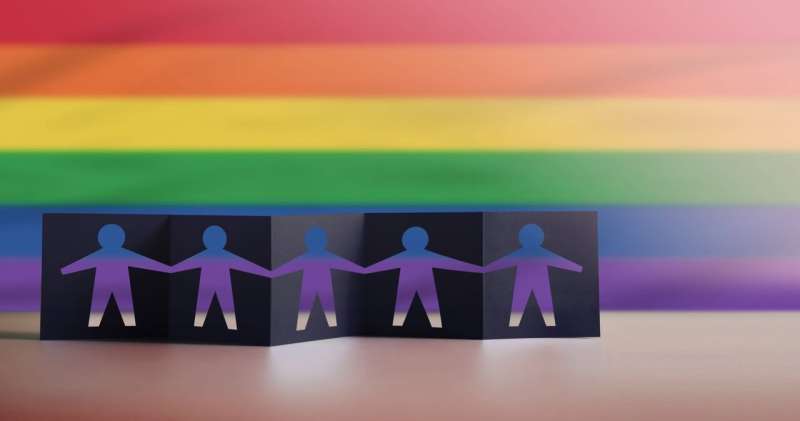This article has been reviewed according to Science X's editorial process and policies. Editors have highlighted the following attributes while ensuring the content's credibility:
fact-checked
trusted source
proofread
Improving the health and well-being of sexual and gender-minority people in Asia

Sexual and gender minority (SGM) is an umbrella term for lesbian, gay, bisexual, transgender, intersex, queer, and other sexually (LGBTIQ+) and gender-diverse people. The two examples above depict the struggle faced by the SGM people in Asia.
Besides criminalization and erasure in their daily lives, SGM people also have limited access to basic rights such as education and health.
To reflect on these life challenges and the diversity of sexual orientations, gender identities or expressions, and sex characteristics, the International Day Against Homophobia, Transphobia, and Biphobia (IDAHOBIT) was established in 2004, and is celebrated on 17 May.
It's consistently found that the SGM populations face more challenges when it comes to mental health than their cisgender and heterosexual peers.
Stigma, discrimination, and marginalization experienced by SGM individuals can lead to increased rates of depression, anxiety, and suicide. These experiences are called minority stresses, and ethnicity could play a role in exacerbating them, with Asian SGM people reporting higher depressive symptoms compared with white SGM people.
One psychotherapy does not fit for all
While various interventions exist to address emotional problems, few have been tailored to meet the unique cultural stressors experienced by SGM individuals, particularly in the global south like Asia, as they can also face oppression from government and society.
They have to live with systemic barriers on a daily basis, which endangers their lives. Therefore, a cultural adaptation of psychological interventions is needed to make these interventions effectively serve diverse cultural groups.
Dialectical behavior therapy (DBT) is one approach that holds promise for adapting to the unique stressors of the SGM populations. DBT emphasizes the teaching of skills to manage emotions, improve relationships, and reduce emotional reactivity.
The approach has shown promise in addressing a range of mental health concerns in the general population, including depression, anxiety, and borderline personality disorder.
This therapy has also been reported to decrease emotion dysregulation and symptoms of depression among sexual-minority veterans in the US. However, as far as we know, the DBT has not been adapted for SGM populations in Asia.
Our research group, the Mindfulness and Health Lab@Monash led by Associate Professor Shian-Ling Keng, recently piloted a trial in Malaysia to examine the effectiveness of a six-session LGBT-affirmative online DBT skills group.
Seventeen LGBT adults with elevated depressive symptoms were recruited through social media and local advocacy organizations.
This adaptation therapy was culturally designed to reduce depressive symptoms and emotion dysregulation in LGBT adults. Our culturally-adapted online DBT intervention, which incorporated LGBT-specific stressors based on Minority Stress Theory, taught the participants mindfulness, emotion regulation, and distress tolerance skills.
Promising results of the adapted psychological therapy
Participants reported significant decreases in depressive symptoms, stress, borderline personality disorder symptoms, emotion dysregulation, and distress due to heterosexist experiences following the DBT skills training.
Additionally, there were significant increases in self-compassion and subjective well-being following the intervention.
These findings demonstrate the potential benefits of LGBT-affirmative DBT skills training in improving psychological health among LGBT individuals in the Malaysian context.
The importance of adapting evidence-based interventions to address the unique needs of marginalized communities cannot be overstated.
The results of this pilot trial suggest that incorporating LGBT-specific stressors into traditional interventions such as DBT may be an effective approach to improving mental health outcomes among SGM individuals. This is especially critical in regions such as the global south where SGM individuals may face greater stigma and discrimination.
Beyond Malaysia, and additional challenges
While our study is the first to evaluate the potential benefits of LGBT-affirmative DBT skills training in the Malaysian context, the approach could also be adapted to other countries in Asia.
For instance, in countries where homosexuality is still illegal, SGM individuals face significant stigma and discrimination every day. The development of LGBTIQ-affirmative DBT skills training could provide a much-needed source of support for this community.
However, adapting DBT for SGM individuals in Asia would require consideration of local cultural and social factors.
In many Asian cultures, family plays a central role in mental health, and traditional approaches to therapy may involve the family in treatment, to improve family support and acceptance.
Another challenge to providing mental health services to SGM individuals in Asia is a lack of training and awareness among mental health professionals.
Many health providers may not have experience working with SGM individuals, or may hold stigmatizing attitudes towards this population.
Training mental health professionals in LGBTIQ-affirmative care and adapting existing interventions such as DBT to address the unique needs of this community can help to overcome these challenges.



















